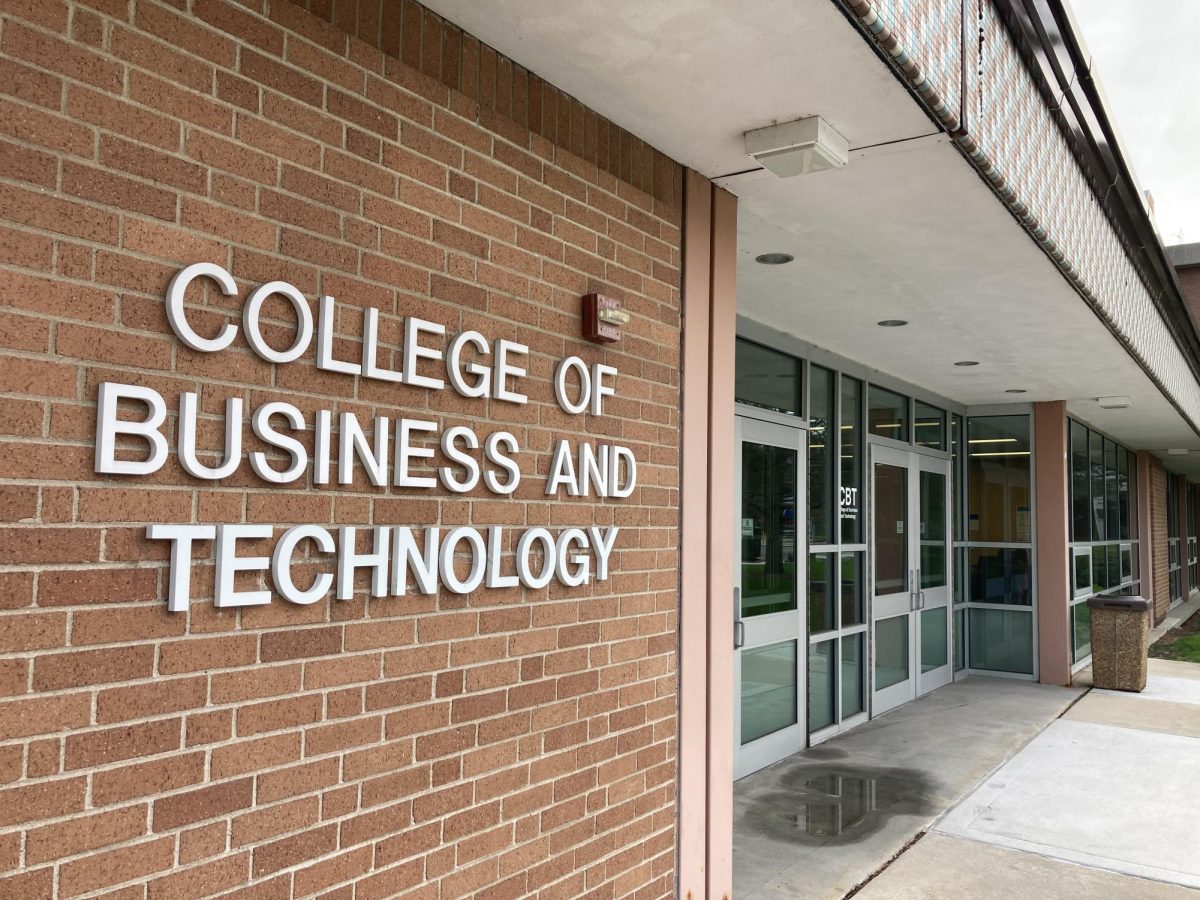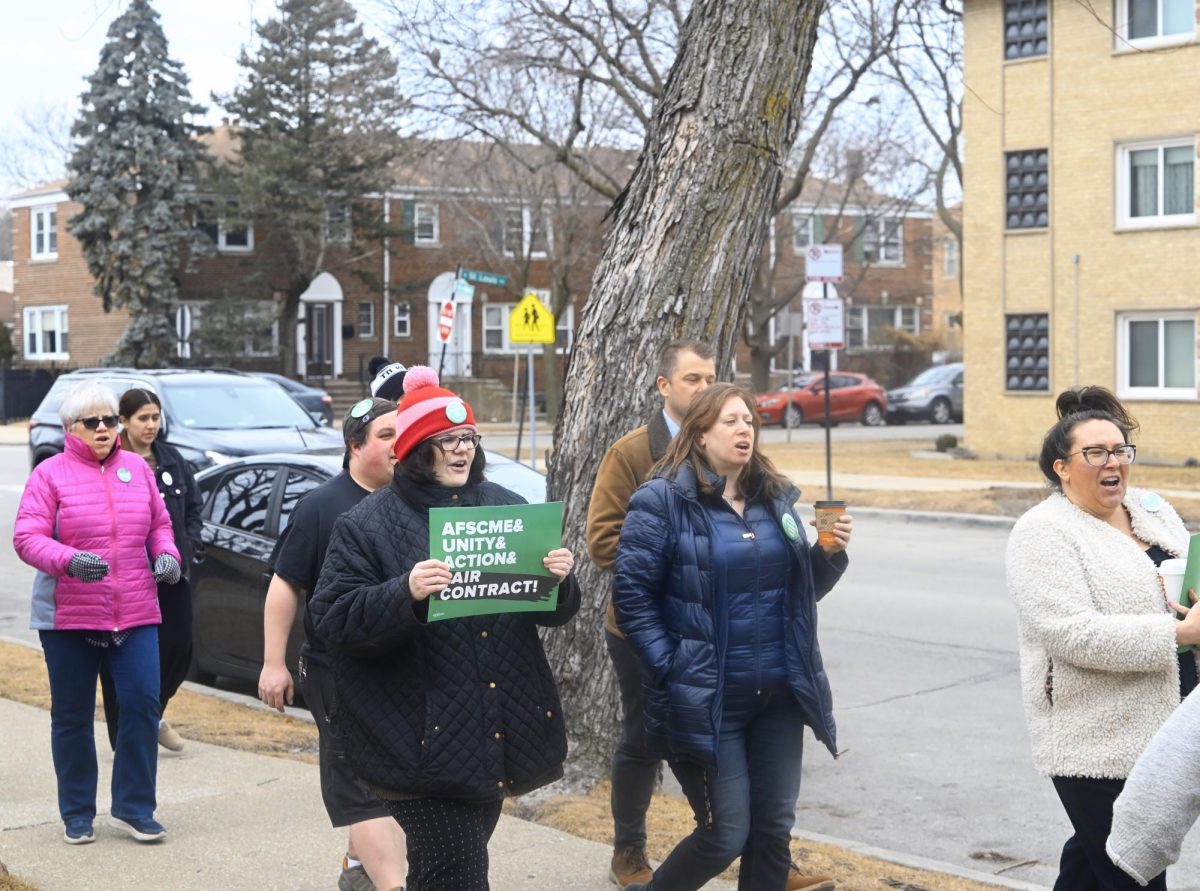According to the NEIU Constitution, the university’s president is required to address the Faculty Assembly with a State of the University Address, similar to the annual State of the Union Address the U.S. president gives to Congress.
Interim President Dr. Katrina Bell-Jordan began her address by acknowledging the faculty, staff and students in attendance, asking each in turn to stand, and recognizing them with a round of applause.
“Everything we do here at NEIU is for you and in service and support for you, our students,” Dr. Bell-Jordan said. “And it’s a reflection of our commitment to providing you the best education and preparation for your graduation and career success.”
During her address, Dr. Bell-Jordan touted enrollment increases in first-time freshmen, transfer students and new graduate students. According to Undergraduate Admissions Director Ryan Trout, at a previous event, this is the first time NEIU has had increases in all three types of students since 2009. However, Dr. Bell-Jordan acknowledged that NEIU’s retention rate had fallen to 60%.
During a question and answer session, attendees raised concerns to Dr. Bell-Jordan and her administrative team on multiple issues, including the name of Lech Walesa Hall, the Workday payroll system, staff workload and turnover.
One attendee asked if there was any way to revisit the name of Lech Walesa Hall, saying, “I find [the name] is a little troubling for me as a trans-woman. And for my LGBT brothers and sisters.” The auditorium erupted in applause at the question.
Dr. Bell-Jordan said that the issue “deserves discussion” and that it was already being discussed in the University Diversity Council (UDC).
Dr. Shireen Roshanravan, NEIU’s Executive Director of Equity, Diversity and Inclusion, said she encouraged the UDC to bring up LWH, saying, “The University Diversity Council can certainly move forward a proposal in that way to be discussed through the channels for engagement… We can certainly take that on.”
On the issue of Workday, Justice Studies professor and Union Professionals of Illinois (UPI) president Dr. Nancy Matthews said, “I find it unbelievable… the number of questions that I get on a daily basis about people’s not being sure what their salary actually is, are just endless.” Matthews continued, “Every single week, there’s some new question or problem.” Matthews was applauded for her statement.
Dr. Bell-Jordan responded that there will be a shared governance meeting on Nov. 3, 2023, regarding Workday issues. The webinar will be open to the public.
Dr. Shannon Saszik, professor of psychology and member of the Faculty Senate, said, “Whatever company I work for, my expectation is that I’ll get paid, I’ll get paid on time and my paycheck will be correct.” She went on, “I still have to pay taxes, and I cannot figure out what I need to do for deductions, what I need to pull out for retirement savings, because you can’t give me a paycheck, which is reflective of my actual pay.”
“You’re absolutely right,” Bell-Jordan said. “The ability for employees, for faculty, staff and our students to know exactly that the salary that they are expecting is the salary that’s going to show up in their bank account is an absolute minimum expectation.”
“Change management is hard,” Manish Kumar, the Vice President for Finance and Administration, said, and acknowledged that the implementation of Workday could have been better. He said that this was the first time all of NEIU’s business processes were being digitized and automated. He also warned that it will take time to fully implement the system, saying, “We will continue to run some challenges in spring as well. But we will work diligently, we will work very closely with you, to fix those problems.”
Kumar also addressed those working on the Workday implementation, saying, “Thank you to Academic Affairs, HR and IT for working so hard on getting things corrected, getting things implemented, right?” He continued, “They are working long hours, and trying to accommodate every request that is being made.”
He also apologized to the NEIU community, saying, “I sincerely apologize to the people, to our faculty, staff and students who are facing these payroll issues.”
Another issue raised by multiple attendees was the overworking and underpayment of university staff. Rebekah Fitchett asked, “What is the university doing to address the issue of the chronic understaffing and civil service positions, leading to burnout and a rise in employee turnover?”
“Part of the work this transitional year,” Dr. Bell-Jordan answered, “is to try to identify where those understaffing resources are most critical. Not that any area is less critical. But those specifically critical to our potential enrollment, student success initiatives, are ones that I believe … are the spaces that we really have to hunker down.”
“This is not a problem or situation that is solved overnight. We didn’t get here overnight,” she continued. “And so I do know that there are concerted conversations in each of the VP areas about where the understaffing exists, and how we can manage our budgets to try to bring back some of those positions.”
Dr. Liz Rodriguez, from the Center for Teaching and Learning and Vice Chair of the University Advisory Council, suggested reimplementing the Employee Excellence Award merit raises, saying she did not remember them happening last year.
Dr. Bell-Jordan confirmed the awards had not occurred last year and continued saying that merit-based awards were in the budget. She said the Employee Excellence Award needed to be “backfilled” for fiscal years 2023 and 2024.
Dr. Rodriguez asked if that was a promise, and Dr. Bell-Jordan responded, “It’s in the budget.”
Dr. Isaura Pulido asked if NEIU would reapply for the Seal of Excelencia, to which Dr. Bell-Jordan replied, “Whether we move forward with the Seal this year, I think will require conversations about what our priorities will be for this year. One of the things that has been important to do in this transitional year is to have some serious conversations about what we really think we can do this year.”
Another attendee asked about the status of the properties on Bryn Mawr Avenue that NEIU had acquired through eminent domain in 2016. Manish Kumar said the mortgage market had changed since assessments and marketing by JLL and CBRE. According to Kumar, mortgage rates at that time were up to 2%. Currently, they are at 8%. Kumar reminded the university community that decisions on the Bryn Mawr properties lie within the scope of the Board of Trustees.
Prior to the question and answer session, Dr. Bell-Jordan highlighted a number of programs and initiatives at NEIU. Among them were an ongoing overhaul of the NEIU website. NEIU is also educating students at Stateville prison through a connection with the Prison + Neighborhood Arts Project. NEIU has the Business Innovation and Growth Center at the Carruther’s Center for Inner City Studies, which it plans to also open on the main campus.
NEIU, in partnership with Argonne National Laboratory, also has instruments for measuring climate change atop Bernard J. Brommel Hall through Community Research on Climate and Urban Science (CROCUS).
Finally, NEIU has a 1.6% budget increase, to $85.3 million, representing the first budget increase in years.
President of the Student Government Association, EJ Schumacher, had this to say of the State of the University Address: “I appreciate and I respect Interim President Bell-Jordan’s attention to the concerns presented, especially from the faculty and staff that stood up today. I’m glad to hear that they are aware of a lot of those concerns. I think that there’s still a lot of work that needs to be done.”
Dr. Bell-Jordan concluded her address to NEIU with a question: “In preparation for that important step in charting NEIU’s path forward. I believe strongly that our campus community is overdue for engagement about, first, how we think about our past, our present and our future. As a Hispanic Serving Institution, a minority-serving institution, as a four-year public, comprehensive institution, and as an urban university that serves a majority of traditionally underrepresented students in higher education. We are also overdue and engaging on what it means to serve this population of students. In other words, what does it mean to be a serving institution? And what does this mean at the classroom level, department level, college and university level?”







